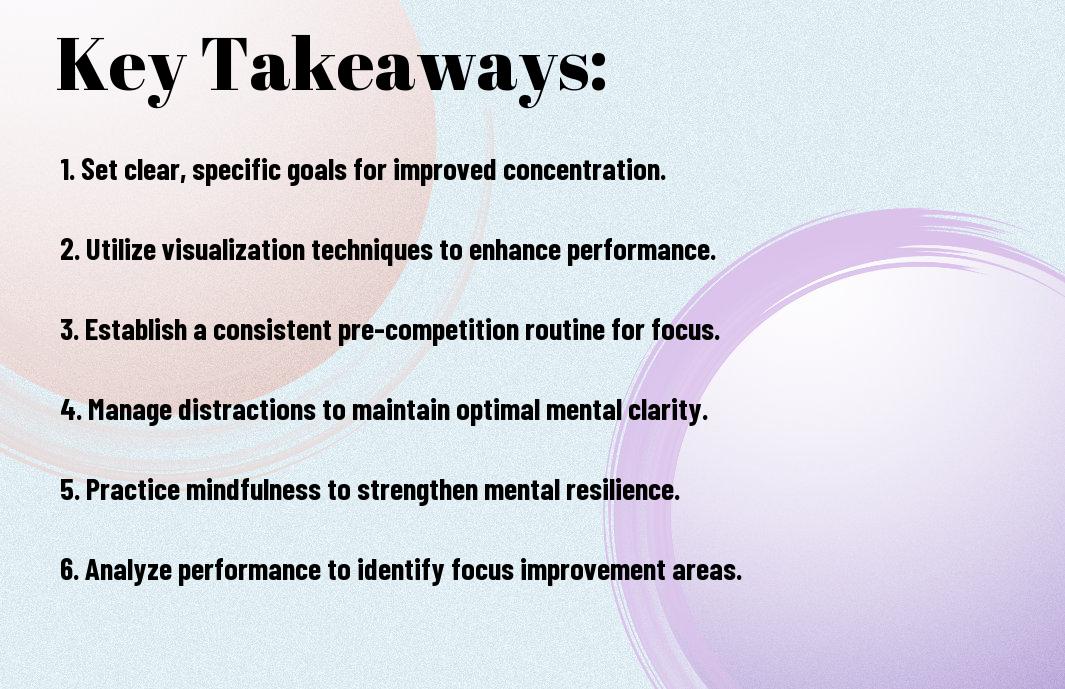Just as physical skills are vital in sports, mastering mental focus is key to your success. This blog post will guide you through practical strategies to enhance your concentration and mental resilience, enabling you to perform at your best even under pressure. By implementing these techniques, you can improve your game, reduce distractions, and increase your overall performance. Let’s probe the fundamentals of honing your mental focus for athletic excellence.
Key Takeaways:
- Mindfulness Practice: Incorporate mindfulness exercises to enhance your awareness and concentration during training and competitions.
- Goal Setting: Define clear, achievable goals to maintain determination and direction in your athletic journey.
- Visualization Techniques: Utilize mental imagery to envision success and improve your performance under pressure.
- Breathing Exercises: Implement controlled breathing strategies to manage stress and maintain focus in high-stakes situations.
- Routine Development: Establish consistent pre-performance routines to create a mental edge and boost confidence.

Understanding Mental Focus
Before you can cultivate mental focus, it’s imperative to grasp what it entails. Mental focus revolves around your ability to concentrate on specific tasks, minimize distractions, and maintain an optimal state of alertness during competition. It is not just a skill but a vital component that can significantly influence your performance in sports. Enhancing this aspect of your mental game can lead to impressive improvements in effectiveness and consistency.
The Importance of Mental Focus in Sports
Among athletes, mental focus is often seen as a key differentiator that separates the good from the elite. Staying focused helps you execute skills with precision, respond to challenges swiftly, and maintain your competitive edge. By honing this ability, you’re setting yourself up for greater success, allowing for a complete immersion in the game where distractions fade away, and performance peaks.
The Science Behind Focus and Performance
An increasing body of research highlights the relationship between mental focus and athletic performance. Studies show that sustained focus is linked to improved decision-making, reaction times, and even physical endurance during competitions. This correlation illustrates that your mental state can directly impact your execution of skills and overall performance.
Considering the neurological aspects, your brain processes information differently when you are in a focused state. Activation of specific brain regions enhances your ability to filter out distractions and prioritize imperative tasks. Neurotransmitters, such as dopamine, play a significant role in motivation and focus, further demonstrating how imperative your mental state is for achieving peak performance. By aligning your focus with these principles, you can optimize your athletic capabilities and reach new heights in your sport.
Techniques to Enhance Mental Focus
One effective way to enhance your mental focus is by incorporating specific techniques into your training routine. Mindfulness practices, such as meditation and journaling, can help you cultivate a concentrated mindset. Additionally, establishing a consistent pre-performance routine can prepare you mentally and physically, allowing you to stay engaged with the task at hand. By integrating these techniques, you’ll find it easier to maintain attention and achieve greater success in your sports endeavors.
Visualization and Imagery
Beside focusing on physical skills, utilizing visualization and imagery can significantly improve your performance. By picturing yourself executing techniques perfectly and achieving your goals, you create a mental blueprint that your body can follow. This practice helps build confidence and can reduce performance anxiety, ultimately leading to more consistent outcomes in your sporting activities.
Breathing Exercises and Relaxation Techniques
By incorporating breathing exercises and relaxation techniques, you can enhance your focus, particularly under pressure. These practices help you calm your mind, allowing you to center your thoughts and reduce anxiety. Simple techniques such as deep-breathing exercises, progressive muscle relaxation, or guided imagery can create a sense of tranquility, ultimately guiding your thoughts back to your sport and boosting your mental concentration.
Focus on using breathing exercises to foster a state of calm and clarity before competitions or intense training. Try practicing deep breaths, inhaling for a count of four, holding for a count of four, and exhaling for a count of four. This rhythmic breathing not only calms your mind but also provides physical benefits, increasing oxygen flow to your muscles. Additionally, taking a few moments for relaxation techniques, such as stretching or mindfulness meditation, can help you reset and sharpen your focus, making you more present in the moment and ready to excel.
Setting Goals for Focus Improvement
Many athletes understand that setting clear goals is imperative for enhancing your mental focus and overall performance. By defining specific targets, you create a pathway that not only guides your training but also helps you stay committed to improving your focus. Establishing these goals enables you to measure your progress and adjust your strategies as necessary, fostering a relentless pursuit of success in your sport.
Short-term vs. Long-term Goals
Around your journey, you’ll find it beneficial to create a mix of short-term and long-term goals. Short-term goals focus on immediate improvements and can provide quick wins to motivate you, while long-term goals keep you aligned with your overarching vision. Balancing these types of goals encourages consistent growth, ensuring you remain engaged and motivated throughout your training cycle.
SMART Goals Framework
For effective goal setting, consider the SMART Goals Framework. SMART stands for Specific, Measurable, Achievable, Relevant, and Time-bound. By breaking your goals down into these components, you can create a roadmap that offers clarity and direction, allowing you to maintain focus on what truly matters in your training and performance.
It’s important to craft your goals with precision. Specificity means knowing exactly what you want to achieve, while measurability allows you to track your progress and stay accountable. Achievability ensures your goals are realistic, motivating you rather than discouraging you. Relevance ties directly to your personal aspirations and sport, and time-bound is about setting deadlines to create urgency. Using the SMART framework, you empower yourself to focus more effectively in your training and competition.

The Role of Routine and Consistency
Keep in mind that establishing a solid routine and maintaining consistency in your training can significantly enhance your mental focus during sports. Developing habits encourages your mind to settle into a flow state, where concentration thrives. For effective techniques, explore Sports Psychology Exercises for Concentration and Focus as you integrate these practices into your lifestyle.
Establishing a Pre-Game Routine
Around game day, creating a structured pre-game routine can help you mentally prepare. This routine may include visualization techniques, breathing exercises, or warm-up sessions to prime your mind and body for peak performance. Tailoring your routine to fit your specific preferences ensures it becomes a reliable element in your game preparation.
Daily Practices for Mental Clarity
Along with pre-game routines, incorporating daily mental exercises is vital for sustaining mental clarity. These exercises can be as simple as mindfulness meditation, journaling about your performance, or engaging in focus-specific drills that sharpen your concentration skills throughout your training.
Practices like visualization and affirmations are excellent daily exercises that reinforce your focus and clarity. You can create mental images of your ideal performance, which helps build confidence and prepares you for the challenges ahead. Additionally, journaling your thoughts and feelings can provide insights into your mental state, enabling you to identify patterns and areas for improvement. Consistently engaging in these activities enhances your overall mental strength, allowing you to perform at your best when it matters most.
Addressing Distractions
To achieve peak performance in sports, it’s important to address distractions that can hinder your focus. Recognizing what diverts your attention allows you to take proactive steps in fostering a more disciplined mindset during training and competitions. Establishing this awareness is the first step towards ensuring that external factors do not disrupt your mental clarity and, ultimately, your success.
Identifying Common Distractions
On your journey to mastering mental focus, recognizing common distractions is vital. These can range from external noise, such as spectators or teammates, to internal thoughts, like self-doubt or worry about performance. Taking the time to pinpoint these interruptions will empower you to combat them effectively, setting a stronger foundation for your focus.
Strategies to Minimize Interruptions
On the path to maintaining focus, implementing strategies to minimize interruptions is vital. This can include creating a designated practice space, utilizing visualization techniques, and practicing mindfulness. By consciously working to reduce distractions, you can enhance your ability to concentrate and perform at your best during critical moments.
With a few targeted strategies at your disposal, you can significantly reduce interruptions that disrupt your focus. Setting up a dedicated training environment free from distractions, incorporating visualization exercises to mentally prepare for competition, and practicing mindfulness techniques to ground yourself in the present moment can all help sharpen your concentration. Additionally, establishing a pre-competition routine can signal to your mind that it’s time to focus, thus reducing the chances of interruptions during high-stakes situations.
The Impact of Physical Health on Mental Focus
All athletes should understand that physical health significantly influences mental focus. When your body is strong and well-cared for, your mind can better concentrate on the task at hand. Engaging in effective mental training for sports success can enhance your overall performance. For more insights, check out Mental training for sports success.
Nutrition and Hydration
An athlete’s performance is deeply intertwined with proper nutrition and hydration. Fueling your body with the right nutrients allows your brain to function optimally, enhancing your focus during training and competitions. Staying well-hydrated is crucial for maintaining energy levels and mental clarity, so prioritize a balanced diet and sufficient fluid intake.
The Importance of Sleep and Recovery
Sleep is one of the most important factors influencing your mental focus. Adequate rest restores your brain function and improves cognitive abilities, allowing you to maintain concentration during high-stakes moments. Prioritizing recovery not only enhances your performance but also supports your overall well-being.
Considering the demands of your training and competition schedules, ensuring you get enough quality sleep is vital. Establish a regular sleep routine to help your body and mind recover efficiently. Incorporating rest days into your training regimen allows for muscle recovery and mental rejuvenation, creating a solid foundation for sustained focus and athletic success.
To wrap up
On the whole, mastering mental focus for sports success requires dedication and practice in integrating various strategies into your routine. By setting clear goals, visualizing your performance, and utilizing relaxation techniques, you can enhance your concentration and resilience during competitions. Additionally, exploring The Nine Mental Skills of Successful Athletes will provide you with crucial tools to sharpen your focus and improve your overall performance. Commit to these practices, and you’ll see significant improvements in your athletic endeavors.
Q: What are effective techniques to enhance mental focus in sports?
A: To enhance mental focus in sports, athletes can employ several techniques. Visualization is a powerful tool; mentally picturing oneself performing well can significantly boost concentration and confidence. Another technique is mindfulness meditation, which encourages staying present and reduces distractions. Establishing pre-performance routines can also help athletes enter the right mindset. These routines might include specific warm-up activities or breathing exercises that signal the brain to focus solely on the task at hand.
Q: How can goal-setting contribute to better mental focus in athletic performance?
A: Goal-setting plays a vital role in improving mental focus by providing clear objectives that athletes can work towards. By establishing specific, measurable, achievable, relevant, and time-bound (SMART) goals, athletes can maintain their attention on what matters most. Breaking larger goals into smaller, manageable milestones allows for a progressive approach, helping to avoid feelings of being overwhelmed. This structured focus directs energy and concentration towards incremental achievements and fosters a growth mindset.
Q: What role does self-talk play in maintaining mental focus during competitions?
A: Self-talk can significantly influence an athlete’s mental focus during competitions. Positive self-talk reinforces confidence and can counter negative thoughts that might arise under pressure. Coaches and athletes can work together to develop empowering phrases that players can repeat to themselves during challenging moments. This internal dialogue can redirect focus away from distractions and onto performance. Practicing these affirmations and challenging negative prompts can enhance an athlete’s ability to stay engaged and present throughout the event.


